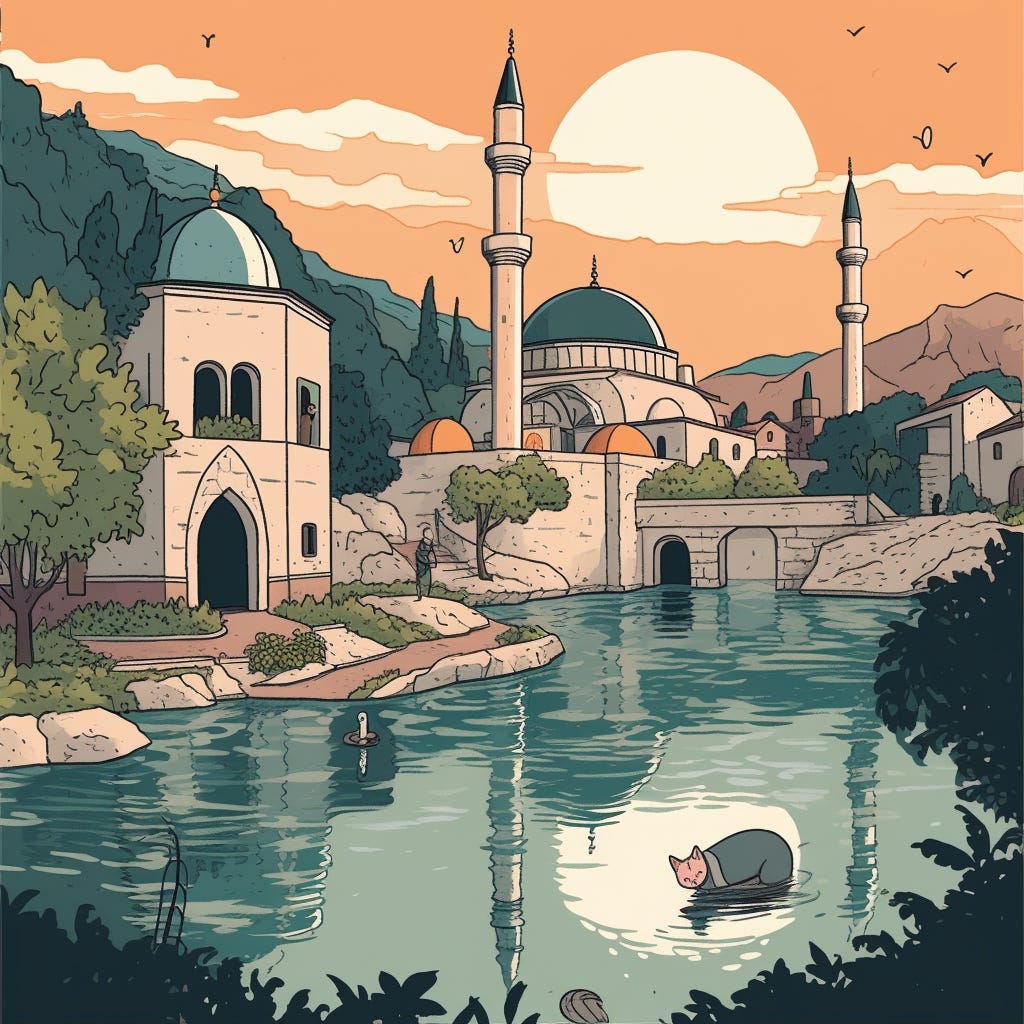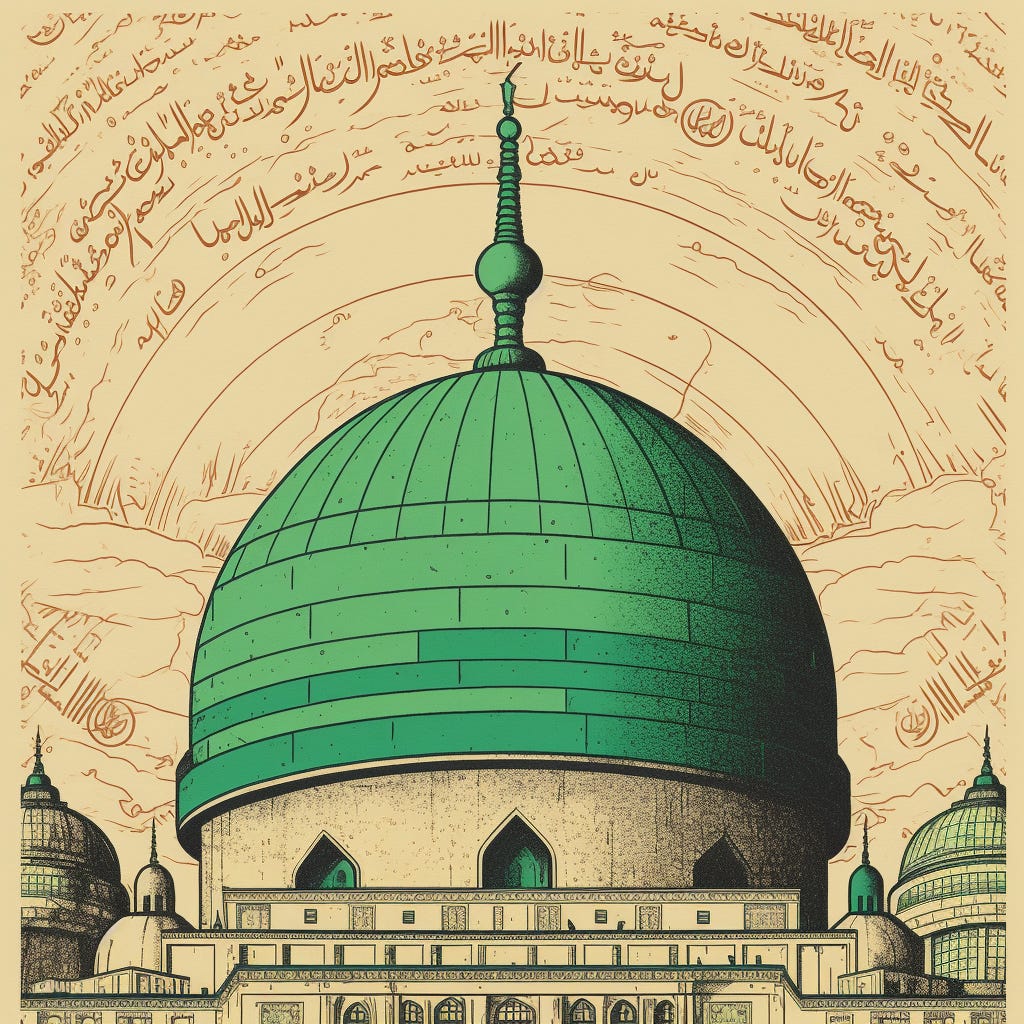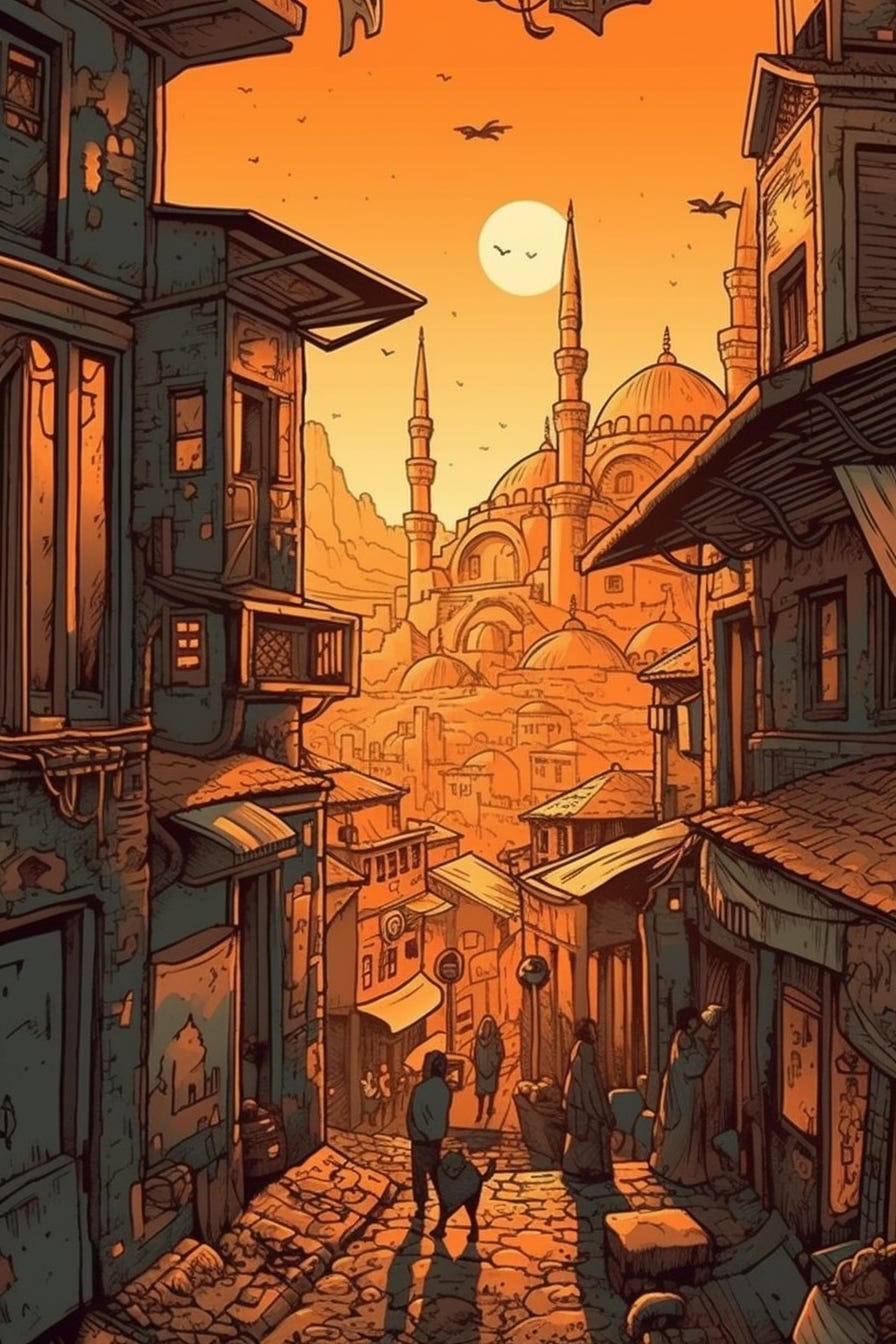Islam, Islamism...Integralism?
Muslims with political opinions are not automatically akin to Catholic integralists
Following my recent appearance on Wisdom of Crowds, I’ve received both praise and criticism for my comments. One persistent critique I’ve noticed is to immediately try and place myself into the same box as Catholic integralist thinkers, folks such as Deneen, Ahmari, Vermeule. Mind you, I respect these thinkers quite deeply (go subscribe to Postliberal Order!). I’m also very aware that these writers have significant differences with one another. But having said all that, I have to speak to this idea that Islamism is to Islam what Integralism is to Catholicism.
When I use the word “Islamism,” I refer to the notion that Islam and the Sharī’a should play a central role in modern political life. Catholic integralism, by contrast, is the view that the temporal power of the state should ideally be subordinate to the spiritual power of the Church, creating an integrated order reflecting man’s responsibilities in this life and the next. Though they differ in many fundamental aspects, Catholic integralists and Muslim Islamists seem to agree that theology and politics cannot exist in separate vacuums. They are inherently linked, and to pretend otherwise would be disingenuous. And it is this shared belief which puts them in an uncomfortable, if not adversarial, relationship with militant secular liberalism. But where exactly do these two approaches diverge and converge?
To really understand Islamism, one has to know a bit about how Muslims have traditionally understood political authority. For Muslims, the institution of the caliphate looms large. Its traditional governing logic historically served as a store of political agency and a long-standing legitimator for Islam in global diplomatic fora. After a long period of slow decline, the Ottoman Caliphate was abolished in 1924 by its successor state, the militantly secular Turkish Republic. Muslims subsequently failed to agree upon who would host the institution next, and nation-states deftly took its place following the withdrawal of Western colonial powers.
Though it portrays itself as timeless and universal, this nation-state—the basic unit undergirding modern diplomacy—is anything but. It emerged out of the rubble of the Thirty Years’ War and the (so-called) Peace of Westphalia of 1648. Fast-forward to today, and the nation-state, modernity’s engine par excellence, has been mainstreamed throughout the world. Among Muslim-majority populations in particular, this copy-pasting of Westphalia has been nothing short of a hack job, imposing a set of historical assumptions alien to Muslim civilization regarding the nature of the "proper" role of religion and state in the public sphere. Chief among these was the idea of the state as the new and ultimate sovereign, subsuming God and His Law beneath it, rather than the other way around.
The normative application of the Sharī’a underwent rupture, impacting the way everyday Muslims understood and experienced their faith, and marking their entrance into modernity itself. What Muslims mean by Sharī’a is not merely “law,” but rather God’s archetypical legal appraisal of various human actions. Qualified and extra-governmental Muslim jurists seek to derive a set of jurisprudence (known as fiqh) as close as possible to the Sharī’a, i.e. God’s ruling on any given act. Western notions of positive law, by contrast, generate a singular body of torts and statutes and precedent for governing society at the state level. Sharī’a discourse has a positive law tradition, but goes beyond it to issue an ever-growing body of legal responsa (fatwas) pertaining to the sub-state governance of the behavior of individuals, couples, families, and more. Because of this more expansive notion of Divine law that exists both above and below the state, Sharī’a discourse in antiquity came to permeate social life at every conceivable level.
But the emaciated Sharī’a that survived into the modern period represented an epistemic rupture in Muslim life. What were before casual assumptions—such as the idea that religion and politics were not separate spheres or disciplines, and in fact fed into one other and were legitimized by the Sharī’a itself—now became, per Salman Sayyid, a "scandal" in the eyes of the state, threatening its hypersovereignty. It's only in our contemporary era that Islam as a modern political ideology had to consciously become an “ism.” As Shadi Hamid notes:
With the advent of the modernists, Islam, for really the first time, became a distinct political project. It never had to become one before because Islam’s role in public life was inescapable—it imbued nearly everything—and, more important, unquestioned. It went without saying, so it wasn’t said.
Historians will argue as to when Islam became an “ism.” (The Ottoman Tanzimat reforms of the mid 1800s? The Silk Letter Movement of the early 1900s? Was it post-caliphate 1924? The establishment of the Muslim Brotherhood in 1928?). But what everyone agrees on is that Islamism emerged in modernity. Its proponents today paradoxically aim to govern the nation-state—the very concept the imposition of which formed Islamism’s entire raison d’etre. In the wake of the failure of the Arab Spring, “Islamism” is changing. Today, Islamism is associated with a wide range of actors, from the highly pragmatic Ennahda Party in Tunisia, to the fanatics of the now-defunct Islamic State (ISIS). The only belief linking such disparate groups is a shared belief that Islam should play a role in public life. Otherwise, they are completely divergent in their methods, approaches, and outcomes. Without additional qualifiers, the term "Islamism"—despite being used by many Muslim political actors themselves—provides insufficient analytic clarity, creating more heat than light. And for those purveyors of anti-Islam animus, it’s this nebulousness of “Islamism” that makes it so useful, a one-size-fits-all scarlet letter by which Islam might be shamed and disciplined into submission.
While they varied in many important ways, Islamists never developed a unique and robust Muslim theory of politics for the modern age, because, for many of them, it was obvious that the state was the prize to be captured. Many of them had no alternative to the nation-state as such, seemingly unable to envision moving beyond it, and presuming that the Sharī’a could be successfully deployed within it despite the radical changes described above. They simply rued the fact that the nation-state’s hyper-sovereign powers were being used in ways they didn’t like. But the idea that the state perhaps ought not to hold such powers eluded them.
Many Islamists envied the modern state’s vast centralizing power, and got to work building and organizing in the hope of one day harnessing the megazord for themselves. The deliberative scholarship of traditional jurists and theologians came to take a backseat to overtly political concerns. It’s perhaps not surprising, then, that Islamism is today accused of harboring a severe “intellectual deficit.” This deficit can be at least partially explained by the fact that Islamism, being a product of and operating within modernity, did not have much to offer in terms of a radical critique of the status quo. There was no issue with Leviathan per se. It only had to be dressed it in a turban. Prior to modernity, things operated quite differently.
The multinational complex existing roughly between Morocco and Malaysia known as the “Muslim world” has had many diverse applications of governance throughout its history. But despite falling short of at times, it can be said that Sunni Muslim law aimed towards a balance of power between jurists, the government, and the different communities, Muslim or otherwise, who existed within these states as subjects. Pronouncement upon legitimate creedal and legal opinions from Islam’s canonical texts was off-limits to executive power, and hawkishly guarded over by the ‘ulamā—Islam’s religious scholars. The caliph or sultan would retain a monopoly over force, an ability to unilaterally enact edicts and decrees not contradictory to the Sharī’ah, as well as administrative law (qānūn) and discretionary punishments (ta’zīr) where the Sharī’a was neutral or gave no opinion—what Sherman Jackson has described as the realm of “the Islamic secular.” There was also the institution known as mazālim courts, whereby the public could lodge complaints and receive recompense for injustices suffered at the hands of state officials.
Sadly, it’s now become common in our day to see the reigning sultan or strongman attempting to constrain the independent ability of the private scholarly class of jurists, theologians, and mystics to define normative Muslim legal, doctrinal, and spiritual practice. This is generally done in tacit cooperation with an indigenous coterie of Westernized secular Muslim elites—elites well-versed in how to cry wolf over imagined threats of "Islamism!" to fellow traveler journalists hiding out in Beirut shisha bars. Their chirping helps ensure that the Western establishment continues to wink at state-sponsored repression of independent Muslim political agency.
Additionally, many of the illustrious madrasas dotting the Muslim world—from which ‘ulama are produced—are oftentimes nationalized, abandoned entirely, or just hollow shells of former glory, their previously large endowments (awqāf) confiscated long ago by either colonial or state authorities. Many states severely punish unauthorized religious instruction outside of its purview. In many such police states, there is such an iron grip over the 'ulamā to the point of them being entirely absorbed them into the government bureaucracy. Democratized information access, too, has led to massively inflated confidence levels among the Muslim laity, generating a hollow autodidactism and increased skepticism as to whether the 'ulamā in the modern world class serve a real purpose any longer. In a bid to reify their dwindling authority in this confusing and hostile environment, many 'ulamā now have adopted a sort of rentier mentality, enthusiastically agreeing to legitimize state policy in exchange for patronage in the form of official titles and positions.
What, then, of our original question? Is Islamism to Islam what integralism is to Catholicism? It depends on what one terms “Islamism.” There is no doubt that Islam itself as normatively understood by its orthodoxy for centuries has laws and doctrines that would be deemed “Islamist,” insofar as Islam has Divine injunctions and guidance that, ideally, aim beyond the realm of individual private conviction that militant secularism liberalism so hesitantly permits faith. What form such an arrangement would take today is the site of debate for Muslims (and we have yet to even bring up ideas like communalistic legal pluralism which would greatly change the tenor of such injunctions). Some Islamists pine after something more “integralist” in nature, i.e. a subordination of executive power to a scholarly class of theologians and jurisprudents (a la Shi’ite Iran). Others hope for a separation of powers between executive state administration and the ‘ulama’s authority to define the diverse body of theology, law, and spirituality. But in several Muslim-majority countries today, the classical modus vivendi between the ‘ulama and the state has long since collapsed, with the state emerging as victor.
It should not be forgotten that secularism came to the Muslim world through the barrel of a gun. In the new Turkish Republic, people were killed for wearing the fez, madrasas and Sufi brotherhoods were closed, headscarves banned in public institutions—and that’s just the tip of the iceberg. 1960s Tunisia tried to ban fasting in Ramadan. In Reza Shah’s Iran, women had their veils removed forcibly, and in public. And the process continues today. Several European countries have banned the face veil. Switzerland bans minarets. France even bans burkinis. Belgium banned halal (and kosher) slaughter. In China’s Uyghur “re-education camps”, prisoners are force-fed alcohol, pork, and communist propaganda. India’s fanatical Hindu nationalists look to follow China’s model with the Muslims of Kashmir. The modern Islamist project can credit its rise at least in part to the reaction against such repression.
In those few countries where elections are free enough for Islamist parties to run and come into power, they have generally campaigned promising to restore Islam’s dignity, and also bring growth and prosperity. While riding into power on a wave of populist grievance from the religious underclass might seem like a great way to get elected in the short-term, it is very much a double-edged sword. If a party paints itself as the “Islamic” alternative, they run the real risk of hurting Islam as a brand when they fail to deliver. And there are real indications which seem to show that Islamist governance failures have given birth to rising rates of irreligiosity and outright atheism in the Muslim world—albeit still low in comparison to the West.
So does all this mean that Islamism is yet another dead end out of liberalism’s labyrinth? Not entirely. The ideal Muslim society won’t come about solely through the winning of elections. As a lived religion with legal, theological, and spiritual elements, Islam makes asks of the whole of society. Institutional impoverishment is a huge issue; high caliber, independent institutions of higher learning must be developed which produce quality jurists, philosophers, and theologians. Cultural creators, too, have a serious role to play in a world dripping with constant written and visual media. Perhaps most importantly, it requires the presence of saintly men and women who radiate Lordly light and inspire people to purify their souls. To overly focus efforts on electoral politics will only result in pyrrhic victory.
Today, there are some “post-Islamism” Muslim voices attempting to theorize a model of Islam and governance that moves beyond the nation-state centered assumptions of the old movements and slogans of yesteryear. I count myself in this camp, if there even is such a thing. As far as I can see, Muslims need to think of models of Islam and governance that can roll back the state without creating societal instability or chaos. Until then, I resonate with the observation of thinkers like Atif Ahmad, who note the “degree to which the Shari‘a of old times has already been preserved by and cemented in the customs of Muslim populations…much of the Shari’a production today is found ‘underground’—unsupervised by government activities and officials.” In short, the source of Islam’s vibrancy lies much more in thick social norms emanating from a lived practice of the Shari’a, bubbling up from below rather than propounded from on high. Seen this way, the role of upright individuals undergirded by deep faith is far more important than capturing the coercive apparatuses of state. To get this balance wrong would be to miss the forest for the trees.
In short, Islam is at once both entangled with and transcendent above politics. Despite political implosion, civil wars, occupation, ethnic cleansing and more, Islam persists. Pondering why this is ought to give people of all faiths pause.






Great post, and completely agree that the focus needs to be on developing the cultural and social milieu for now, until we can gain a monopoly on violence and finance, currently owned or underwritten by the US MIC and the global financial system. Democracy needs to go in order for this to happen, and a meritocratic elite needs to be cultivated IMHO.
https://hsog.substack.com/p/wars-battles-and-isms